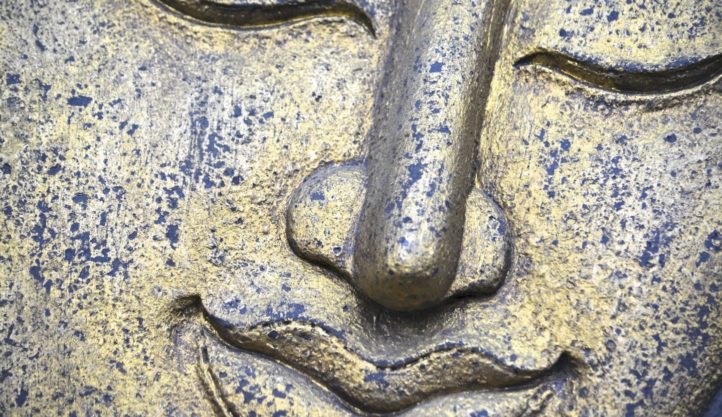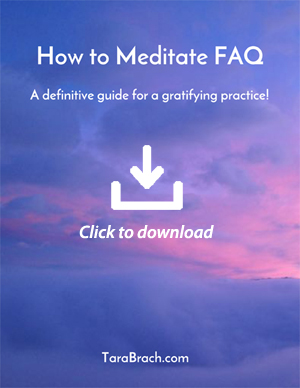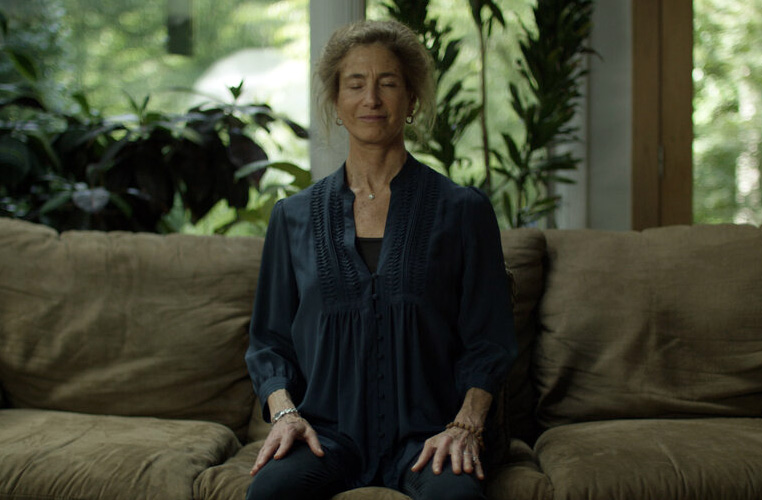by Tara Brach (This article originally was published in Awakening Mind, December, 2003)
My friend was late for our lunch date and I had nothing to do. My cell phone wasn’t charged and I’d forgotten to bring a book. Perusing the menu only lasted for so long. Surrounded by people chatting with each other, eating, doing what they came to do, I felt restless, anxious, irritated. I had a to-do list with looming deadlines, and there I was, stuck, wasting time. After resisting the urge to write notes on a napkin about nothing important, I started wondering why I couldn’t settle down and relax. Why was just sitting here so unpleasant?
As I directed my attention inward, I could feel the tightness in my throat, and my heart pounding inside a constricted chest. I wanted to be accomplishing something. Instead I felt helpless and trapped. Even though I knew consciously that ticking items off my to-do list wouldn’t make me a better, more respectable, lovable person, that wasn’t stopping the plunge into my underlying fear of falling short, the sense that if I didn’t get busy, something would go wrong. I didn’t want to “be here now.”
When we look closely, we find that we pass a great deal of time within the mental frame of being “on our way to the next thing”—completing a task that has been hanging over us, getting to our next meal, disengaging from a phone conversation. Now is not as important as doing something to relieve the stress we feel from unmet wants and gnawing fears. We don’t like the feelings that arise inside us when we are forced simply to wait.
But in life we have to wait a lot. According to one study, the average person in our culture spends eleven days a year just waiting in lines—and this doesn’t count time in planes and cars waiting to “get there.” Nor does it include hours of listening to electronic messages or waiting for TV commercials to end so that we can get back to the main feature. Throughout our day, red lights get in our way. Waiting is stressful, but it is part of the life of all creatures. There is stress in waiting for food, for sex, for warmth, for shelter, for recognition, for peace. As long as we have wants and fears, we are waiting for fulfillment or relief. The big question in spiritual practice is, how do we react to biological and psychological stress? Do we think having to wait and tolerate discomfort is a mistake, a glitch in the system?
When other people seemingly interfere with our progress, our frustration fixates on them. At work a colleague takes a sick day and we miss a deadline. At home our child is dawdling instead of getting dressed, our spouse has not paid the bills, the carpenter has taken two weeks to complete a kitchen renovation that was supposed to take four days. The more we are attached to our agenda, the more irritated we become. When people in our world do not cooperate with what we want, it can feel like a personal affront, sabotaging our efforts to be in control.
The striving and haste and irritation we feel when things don’t go our way are all hallmarks of impatience. If this is our habitual reaction to delay, we are at war with many of our life moments. In our anxiety to “get on with it,” we miss the silhouette of the tree branches against the sky at dusk, we neglect listening well to our children, we lose the opportunity to be intimate with the beings in our life. Impatience undermines the deep attention that reveals our own essence as loving awareness.
The Buddha considered patience to be a “perfection of the heart”—one of the basic spiritual qualities that expresses our deepest nature. He recognized that feelings of discontent—wanting life to be different, fearing that something will go wrong—are universal, and taught that it is possible to cultivate patience in the midst of inherent dissatisfaction. Patience is not the absence of strong emotions, nor is it the denial of unpleasantness. Patience is the capacity to feel at home, to be accepting in the face of the tension and anxiety of stress. In Western psychology, the term “affect tolerance” refers to this same ability to experience intense feelings without disassociating from them or becoming overwhelmed. Even though we don’t like the stress of unmet wants and unresolved fear, patience allows us to persevere with tolerance, reasonable calm and care.
In the restaurant that day, I realized that the anxious undercurrent of “something’s about to go wrong” was driving my feeling of impatience. Rather than feeding those thoughts and feelings, I paused and asked myself “Is there really a problem? Is anything really wrong or missing right now?” As I let go of the restless thoughts that had been contracting my mind, I began to notice what was happening inside me. I was aware of tightness, anxiety, short breath—but no problem. Nothing was wrong or missing. By the time my friend arrived for lunch, “waiting” had become moment-to-moment presence. No longer trying to get somewhere else, the impatience and irritation had dissolved. I felt open, alive—and glad to see her.
When I move through the day with the filter of “intending to be patient,” the enormity and pervasiveness of my impatience can be striking. Again and again, I find myself pressing forward, leaning into the future, trying to complete the task at hand, feeling the tension of wanting it already done. Recognizing this gives me the opportunity to choose to step out of my mental stories about what I’m doing and where I’m going. I can explore coming home to the fullness of what’s happening here and now.
Cultivating patience begins with setting our intention to meet the moments of our life with patience. When we are caught resisting the moment and leaning into the future, there are several ways of inclining our minds towards this perfection of the heart:
- Whatever is happening, no matter how difficult, we can reflect on the understanding that “This too will pass.” Realizing that experience is impermanent and fluid awakens our interest in what is happening and our willingness to open to life, as it is.
- We can ask ourselves “What really matters?” and remember that what we most value—love, compassion, intimacy, creativity—is found in wholehearted presence.
- We can reaffirm the bodhisattva’s aspiration that this, and all experience, may serve awakening. With any one of these reflections, we reconnect with the spaciousness of mind, the clarity, compassion and motivation that support genuine presence. The ground of patience is our capacity to be with life, just as it is.
As writer Storm Jameson reminds us,
There is only one world, the world pressing against you at this minute. There is only one minute in which you are alive, this minute here and now. The only way to live is by accepting each minute as an unrepeatable miracle.
Patience as a perfection of the heart opens us to the mystery and beauty of this life. Rather than racing to the finish line, ultimately death, patience helps us to slow down. Others can find comfort and healing in us as we come home to the openness and tenderness of patient presence. By releasing our attachment to having life a certain way, we receive the blessings of the awareness that is always and already here.
Tara Brach is a teacher and founder of the Insight Meditation Community of Washington, D.C., and teaches throughout the United States and Europe. She is a clinical psychologist and author of Radical Acceptance: Embracing Your Life with the Heart of a Buddha, True Refuge: Finding Peace and Freedom in Your Own Awakened Heart, and Radical Compassion: Learning to Love Yourself and Your World with the Practice of R.A.I.N..


